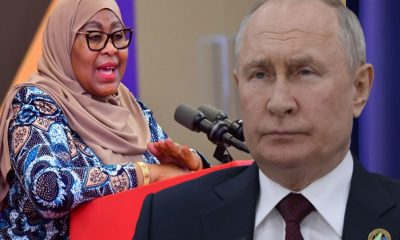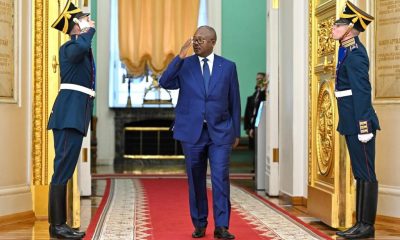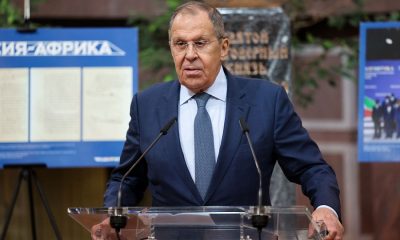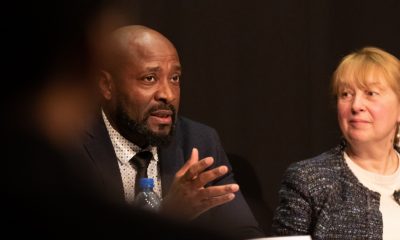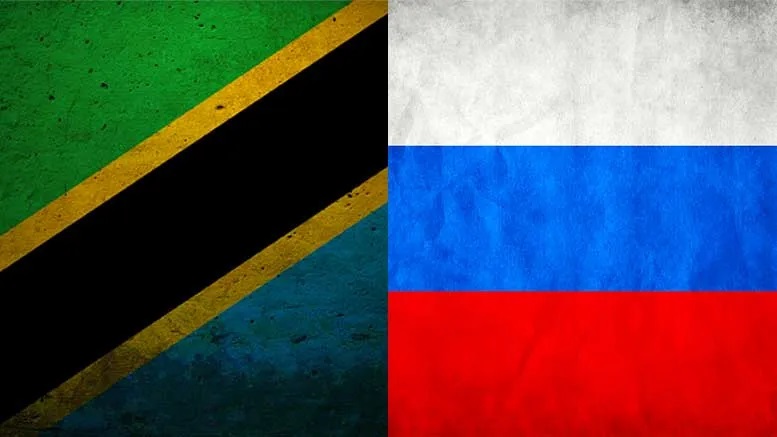World
Britain, Russia Face Rocky Relations as Liz Truss Becomes New Prime Minister
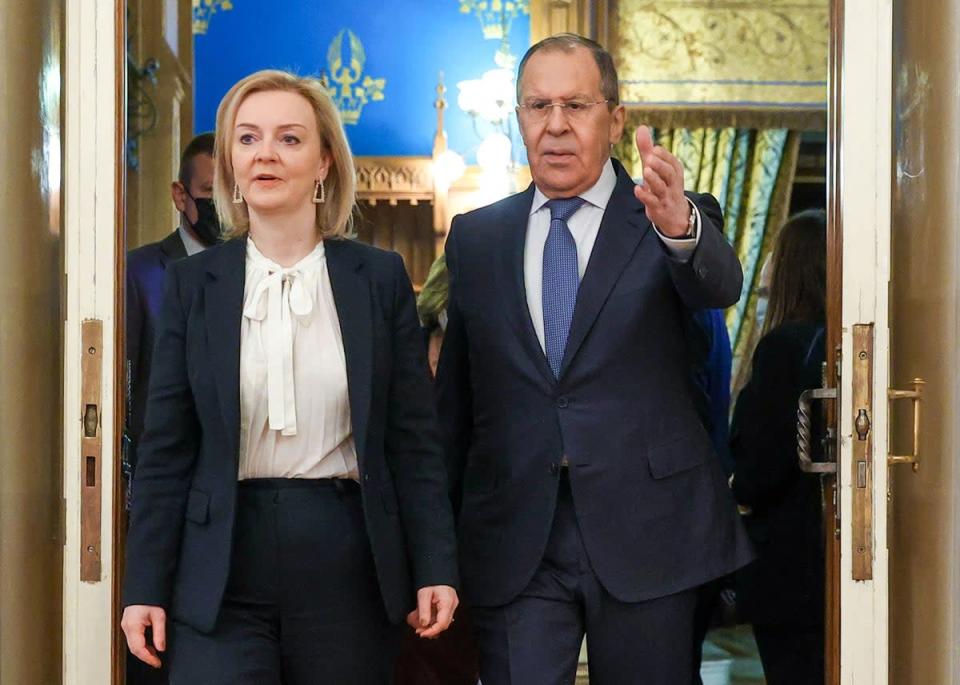
By Kestér Kenn Klomegâh
The Russian and Western media headlines have glaringly shown the future of Britain-Russia’s bilateral relationship and how that will further work in a multilateral format in the context of the current global changes as Ms Liz Truss becomes Britain’s new Prime Minister.
Of course, this does not need a simplified or detailed explanation, as both have locked horns over many publicly-known issues within the context of geopolitical changes.
Media articles’ headlines, “Kremlin scathing over Truss but Kyiv praises Britain’s new PM” (The Guardian) and, “Russia says relations with Britain could get worse as Truss elected PM” (The Independent) painted gloomy pictures of the future relations between the two countries. And of course, Britain and Russia have been struggling to raise their bilateral relations during these past several years with little success.
Britain’s new Prime Minister Liz Truss is not new to Britain and Russia’s politics and diplomacy, and geopolitical changes. She previously served as the British Foreign Secretary. Now, she has won the race for the leadership of the ruling Conservative Party, as indications from the results of an internal party vote, declared on September 5.
Truss, 47, received the votes of 81,326 rank-and-file Conservatives. Her rival, former Finance Minister Rishi Sunak, 42 got 60,399 votes. As the leader of the ruling party, Truss replaces Boris Johnson as Prime Minister and has to appoint a new cabinet. Truss becomes Britain’s 56th Prime Minister, and formally confirmed as head of Her Majesty’s Government at an audience with Queen Elizabeth II.
Ms Liz Truss’ perspectives on many important issues are completely at variance with the position often taken by the Russian Federation.
In July 2022, Foreign Ministry Spokeswoman Maria Zakharova criticized her in an official statement for her anti-Russia remarks which are invariably steeped in painful aggression and nationalism, that is, Russophobia. Within the political spectrum, she is considered a threat to the country and its leadership, especially the current “special military operation” in Ukraine.
“She looks like a second-rate politician afflicted by megalomania. And she is doing all of this instead of addressing the issues at home, which are plenty. This collection of empty slogans vocalised by a raging Truss clearly shows that, in fact, she is either unable to spot the serious crisis in the economy and in domestic politics in a country whose government she is striving to lead, or she simply does not know how to overcome it and is trying to distract voters. Clearly, the well-being and living standards of ordinary Brits are not among her priorities,” Zakharova described her in comments posted to the official website on July 14.
While there are thousands of shreds of evidence pointing to the worsening bilateral relations in political, economic and cultural spheres between the two countries, Russia usually slams Britain together with the European Union into the same category. Similar to the previous well-known Cold War, Russia is battling multiple confrontations from the United States and European Union.
Russia, most often, views Britain from its historical perspectives and the colonial past and directly connects with the present time. Russian authorities have convincingly and publicly highlighted the British colonial practices that spanned more than half a century. Perhaps, taking a line from Russia’s MFA sources, Russia views these two geopolitical blocs as “aggressive and warlike nature and obvious narrow-mindedness” and to deepen our understanding of the situation.
As Foreign Minister Sergey Lavrov pointed out during the 30th Assembly of the Council on Foreign and Defence Policy, “The external circumstances have not changed radically, not becoming more elevated unfortunately with each passing day. The choice we have taken is made easier by the fact that the ‘collective West’ has declared a total hybrid war against us. It is hard to forecast how long this will last. But it is clear that its consequences will be felt by everyone without exception throughout the world.”
Lavrov further explained that this is not only and not so much about Ukraine, having decided the way to global hegemony, which is being used as an instrument to contain the peaceful development of the Russian Federation in the context of their course to perpetuate a unipolar world order, right after the end of the Cold War. Russia’s diplomacy is, on the one hand, to act with great resolve to fend off all adversarial attacks, while, on the other hand, to consistently, calmly and patiently reinforce positions in order to facilitate Russia’s sustained development from within and improve the quality of life for its people.
Britain’s diplomacy has posed problems, in the political, economic and cultural spheres of the Russian Federation. In the cultural sphere, for instance, Russia was forced to close the British Council. Until now, educational and consular services are still not resolved, and many important issues in political and economic bilateral cooperation. At one time, the fatal 2006 poisoning of former Russian security officer Alexander Litvinenko in London. And the next one, London also used the incident in Salisbury linked with the suspected poisoning of former GRU employee Sergei Skripal and his daughter Yulia as a provocation against Russia.
Britain has joined the United States, Canada, Europe, Australia and many other countries in imposing draconian sanctions on Russia. In addition to that, Britain as a member of the Group of Seven acts in complete coalition with Canada, France, Germany, Italy, Japan and the United States on a number of issues against the Russian Federation. The Group of Seven is composed of the seven wealthiest advanced countries.
After the historic fall of the Soviet era, Russia dreamed of raising its status by joining international organizations. Over the past three decades, Russia became a member of many global bodies, participating actively in the United Nations. But with the Group of Eight (G-8), due to sharp differences among members and the last straw relates to its undertaking of “a special military operation” in Ukraine, Russia ultimately withdrew its membership.
David Harding, a British journalist and author, in early September wrote that Russia’s relations with Britain would get worse under new Prime Minister Liz Truss. He referred to issues that include a growing energy price crisis and the war in Ukraine, both of which are affected by Britain’s relations with Russia. The article was based on Kremlin’s warning shots across the new government by claiming that the low level of the current relations between Moscow and London could get even worse than they are now.
“I wouldn’t like to say that things can change for the worse, because it’s hard to imagine anything worse,” Kremlin spokesman Dmitry Peskov said when asked if Moscow expected any shift in relations with Britain. “But unfortunately, this cannot be ruled out, given that the contenders for the post of British prime minister competed with each other in anti-Russian rhetoric, in threats to take further steps against our country, and so on. Therefore, I don’t think that we can hope for anything positive.”
Truss is chiefly known in Russia for a visit she made to Moscow in February when she and Foreign Minister Sergey Lavrov held a rancorous meeting. Lavrov described their conversation as like a dialogue between deaf and mute people, complaining that facts had ‘bounced off’ her. Russia’s foreign ministry has also openly mocked her over geographical gaffes, including on one occasion when she mixed up the Black and Baltic seas.
Truss openly challenged Lavrov at their meeting over Russia’s troop build-up near Ukraine, saying: “I can’t see any reason for having 100,000 troops stationed on the border, apart from to threaten Ukraine.” Moscow, which had denied invasion plans, sent its troops in two weeks later. Since then, Britain has been one of the most active and vocal supporters of Ukraine in the war, supplying it with weapons and training.
While there have been several congratulatory messages for Liz Truss, none came from Russia’s official domain. Dutch PM Mark Rutte said on Twitter: “The Netherlands has long enjoyed close ties with the UK, and I look forward to working with Ms Truss to strengthen them even further.”
In addition, Austrian media compared her to Margaret Thatcher but one French newspaper, Les Echos, called her an Iron Weathercock, rather than Iron Lady, for constantly changing political position. Further, German chancellor Olaf Scholz also took to social media to proclaim: “The UK and Germany will continue to work closely together – as partners and friends.”
Russian media, however, published many reports about political developments and have speculated about the directions in future relations. Russia’s wide-circulated Izvestia wrote that British Foreign Secretary Liz Truss has become the new prime minister. As a successor and loyal supporter of former leader Boris Johnson, Truss would lead the ruling Conservative Party, at least, till the 2024 parliamentary election. “Notorious for her harsh rhetoric on Russia, Truss used it proactively in her election campaign. And yet foreign policy is secondary for the British, with a solution to the energy crisis and the fight against falling living standards being their top priorities,” wrote the newspaper.
The British PM favours active support for Kiev and believes the goal for London is to have Russia defeated in Ukraine. With that in mind, Truss could be viewed as a direct successor of Boris Johnson’s policies. The outgoing premier, perhaps, was involved in the Ukrainian conflict more than any other Western leader. Boris Johnson visited Kiev, the Ukrainian capital, three times since Russia launched its special military operation, and he was accused of overlooking domestic issues due to his preoccupation with foreign policy.
The key tasks faced by the new prime minister certainly relate to the economy and the well-being of ordinary citizens. “The United Kingdom is faring much worse economically than the other West European countries,” Vasily Yegorov, an expert on British politics and the author of the Westminister channel on Telegram, told Izvestia. According to forecasts, Great Britain could face 18-22% inflation rates. If the government copes with that issue this fall, it would be easier further down the road. Truss should come up with her economic program in the near future.
Britain and Russia established relations several years ago. Even with the end of the Cold War and the fall of the Berlin Wall much of the relationship has been under constant strain. During these past few years, the relationship has been tense due to European Union sanctions against Russia. The British were viewed as a driving force for those sanctions, making the relationship awkward. In conclusion, Britain and Russia will still have rocky relations in the coming years and even more turbulent over many bilateral and global policy issues under Liz Truss, the new Prime Minister of Britain.
World
AfBD, AU Renew Call for Visa-Free Travel to Boost African Economic Growth

By Adedapo Adesanya
The African Development Bank (AfDB) and the African Union have renewed their push for visa-free travel to accelerate Africa’s economic transformation.
The call was reinforced at a High-Level Symposium on Advancing a Visa-Free Africa for Economic Prosperity, where African policymakers, business leaders, and development institutions examined the need for visa-free travel across the continent.
The consensus described the free movement of people as essential to unlocking Africa’s economic transformation under the African Continental Free Trade Area (AfCFTA).
The symposium was co-convened by AfDB and the African Union Commission on the margins of the 39th African Union Summit of Heads of State and Government in Addis Ababa.
The participants framed mobility as the missing link in Africa’s integration agenda, arguing that while tariffs are falling under AfCFTA, restrictive visa regimes continue to limit trade in services, investment flows, tourism, and labour mobility.
On his part, Mr Alex Mubiru, Director General for Eastern Africa at the African Development Bank Group, said that visa-free travel, interoperable digital systems, and integrated markets are practical enablers of enterprise, innovation, and regional value chains to translate policy ambitions into economic activity.
“The evidence is clear. The economics support openness. The human story demands it,” he told participants, urging countries to move from incremental reforms to “transformative change.”
Ms Amma A. Twum-Amoah, Commissioner for Health, Humanitarian Affairs and Social Development at the African Union Commission, called for faster implementation of existing continental frameworks.
She described visa openness as a strategic lever for deepening regional markets and enhancing collective responses to economic and humanitarian crises.
Former AU Commission Chairperson, Ms Nkosazana Dlamini-Zuma, reiterated that free movement is central to the African Union’s long-term development blueprint, Agenda 2063.
“If we accept that we are Africans, then we must be able to move freely across our continent,” she said, urging member states to operationalise initiatives such as the African Passport and the Free Movement of Persons Protocol.
Ghana’s Trade and Industry Minister, Mrs Elizabeth Ofosu-Adjare, shared her country’s experience as an early adopter of open visa policies for African travellers, citing increased business travel, tourism, and investor interest as early dividends of greater openness.
The symposium also reviewed findings from the latest Africa Visa Openness Index, which shows that more than half of intra-African travel still requires visas before departure – seen by participants as a significant drag on intra-continental commerce.
Mr Mesfin Bekele, Chief Executive Officer of Ethiopian Airlines, called for full implementation of the Single African Air Transport Market (SAATM), saying aviation connectivity and visa liberalisation must advance together to enable seamless travel.
Regional representatives, including Mr Elias Magosi, Executive Secretary of the Southern Africa Development Community, emphasised the importance of building trust through border management and digital information-sharing systems.
Ms Gabby Otchere Darko, Executive Chairman of the Africa Prosperity Network, urged governments to support the “Make Africa Borderless Now” campaign, while tourism campaigner Ras Mubarak called for more ratifications of the AU Free Movement of Persons protocol.
Participants concluded that achieving a visa-free Africa will require aligning migration policies, digital identity systems, and border infrastructure, alongside sustained political commitment.
World
Nigeria Exploring Economic Potential in South America, Particularly Brazil

By Kestér Kenn Klomegâh
In this interview, Uche Uzoigwe, Secretary-General of NIDOA-Brazil, discusses the economic potential in South America, particularly Brazil, and investment incentives for Brazilian corporate partners for the Federal Republic of Nigeria (FRN). Follow the discussion here:
How would you assess the economic potential in the South American region, particularly Brazil, for the Federal Republic of Nigeria? What investment incentives does Nigeria have for potential corporate partners from Brazil?
As the Secretary of NIDOA Brazil, my response to the questions regarding the economic potentials in South America, particularly Brazil, and investment incentives for Brazilian corporate partners would be as follows:
Brazil, as the largest economy in South America, presents significant opportunities for the Federal Republic of Nigeria. The country’s diverse economy is characterised by key sectors such as agriculture, mining, energy, and technology. Here are some factors to consider:
- Natural Resources: Brazil is rich in natural resources like iron ore, soybeans, and biofuels, which can be beneficial to Nigeria in terms of trade and resource exchange.
- Growing Agricultural Sector: With a well-established agricultural sector, Brazil offers potential collaboration in agri-tech and food security initiatives, which align with Nigeria’s goals for agricultural development.
- Market Size: Brazil boasts a large consumer market with a growing middle class. This represents opportunities for Nigerian businesses looking to export goods and services to new markets.
- Investment in Infrastructure: Brazil has made significant investments in infrastructure, which could create opportunities for Nigerian firms in construction, engineering, and technology sectors.
- Cultural and Economic Ties: There are historical and cultural ties between Nigeria and Brazil, especially considering the African diaspora in Brazil. This can facilitate easier business partnerships and collaborations.
In terms of investment incentives for potential corporate partners from Brazil, Nigeria offers several attractive incentives for Brazilian corporate partners, including:
- Tax Incentives: Various tax holidays and concessions are available under the Nigerian government’s investment promotion laws, particularly in key sectors like agriculture, manufacturing, and technology.
- Repatriation of Profits: Brazil-based companies investing in Nigeria can repatriate profits without restrictions, thus enhancing their financial viability.
- Access to the African Market: Investment in Nigeria allows Brazilian companies to access the broader African market, benefiting from Nigeria’s membership in regional trade agreements such as ECOWAS.
- Free Trade Zones: Nigeria has established free trade zones that offer companies the chance to operate with reduced tariffs and fewer regulatory burdens.
- Support for Innovation: The Nigerian government encourages innovation and technology transfer, making it attractive for Brazilian firms in the tech sector to collaborate, particularly in fintech and agriculture technology.
- Collaborative Ventures: Opportunities exist for joint ventures with local firms, leveraging local knowledge and networks to navigate the business landscape effectively.
In conclusion, fostering a collaborative relationship between Nigeria and Brazil can unlock numerous economic opportunities, leading to mutual growth and development in various sectors. We welcome potential Brazilian investors to explore these opportunities and contribute to our shared economic goals.
In terms of this economic cooperation and trade, what would you say are the current practical achievements, with supporting strategies and systemic engagement from NIDOA?
As the Secretary of NIDOA Brazil, I would highlight the current practical achievements in economic cooperation and trade between Nigeria and Brazil, alongside the supporting strategies and systemic engagement from NIDOA.
Here are some key points:
Current Practical Achievements
- Increased Bilateral Trade: There has been a notable increase in bilateral trade volume between Nigeria and Brazil, particularly in sectors such as agriculture, textiles, and technology. Recent trade agreements and discussions have facilitated smoother trade relations.
- Joint Ventures and Partnerships: Successful joint ventures have been established between Brazilian and Nigerian companies, particularly in agriculture (e.g., collaboration in soybean production and agricultural technology) and energy (renewables, oil, and gas), demonstrating commitment to mutual development.
- Investment in Infrastructure Development: Brazilian construction firms have been involved in key infrastructure projects in Nigeria, contributing to building roads, bridges, and facilities that enhance connectivity and economic activity.
- Cultural and Educational Exchange Programs: Programs facilitating educational exchange and cultural cooperation have led to strengthened ties. Brazilian universities have partnered with Nigerian institutions to promote knowledge transfer in various fields, including science, technology, and arts.
Supporting Strategies
- Strategic Trade Dialogue: NIDOA has initiated regular dialogues between trade ministries of both nations to discuss trade barriers, potential markets, and cooperative opportunities, ensuring both countries are aligned in their economic goals.
- Investment Promotion Initiatives: Targeted initiatives have been established to promote Brazil as an investment destination for Nigerian businesses and vice versa. This includes showcasing success stories at international trade fairs and business forums.
- Capacity Building and Technical Assistance: NIDOA has offered capacity-building programs focused on enhancing Nigeria’s capabilities in agriculture and technology, leveraging Brazil’s expertise and sustainable practices.
- Policy Advocacy: Continuous advocacy for favourable trade policies has been a key focus for NIDOA, working to reduce tariffs and promote economic reforms that facilitate investment and trade flows.
Systemic Engagement
- Public-Private Partnerships (PPPs): Engaging the private sector through PPPs has been essential in mobilising resources for development projects. NIDOA has actively facilitated partnerships that leverage both public and private investments.
- Trade Missions and Business Delegations: Organised trade missions to Brazil for Nigerian businesses and vice versa, allowing for direct engagement with potential partners, fostering trust and opening new channels for trade.
- Monitoring and Evaluation: NIDOA implements a rigorous monitoring and evaluation framework to assess the impact of various initiatives and make necessary adjustments to strategies, ensuring effectiveness in achieving economic cooperation goals.
Through these practical achievements, supporting strategies, and systemic engagement, NIDOA continues to play a pivotal role in enhancing economic cooperation and trade between Nigeria and Brazil. By fostering collaboration and leveraging shared resources, we aim to create a sustainable and mutually beneficial economic environment that promotes growth for both nations.
Do you think the changing geopolitical situation poses a number of challenges to connecting businesses in the region with Nigeria, and how do you overcome them in the activities of NIDOA?
The changing geopolitical situation indeed poses several challenges for connecting businesses in the South American region, particularly Brazil, with Nigeria. These challenges include trade tensions, shifting alliances, currency fluctuations, and varying regulatory environments. Below, I will outline some of the specific challenges and how NIDOA works to overcome them:
Current Challenges
- No Direct Flights: This challenge is obviously explicit. Once direct flights between Brazil and Nigeria become active, and hopefully this year, a much better understanding and engagement will follow suit.
- Trade Restrictions and Tariffs: Increasing trade protectionism in various regions can lead to higher tariffs and trade barriers that hinder the movement of goods between Brazil and Nigeria.
- Currency Volatility: Fluctuations in the value of currencies can complicate trade agreements, pricing strategies, and overall financial planning for businesses operating in both Brazil and Nigeria.
- Different regulatory frameworks and compliance requirements in both countries can create challenges for businesses aiming to navigate these systems efficiently.
- Supply Chain Disruptions: Changes in global supply chains due to geopolitical factors may disrupt established networks, impacting businesses relying on imports and exports between the two nations.
Overcoming Challenges through NIDOA.
NIDOA actively engages in discussions with both the Brazilian and Nigerian governments to advocate for favourable trade policies and agreements that reduce tariffs and improve trade conditions. This year in October, NIDOA BRAZIL holds its TRADE FAIR in São Paulo, Brazil.
What are the popular sentiments among the Nigerians in the South American diaspora? As the Secretary-General of the NIDOA, what are your suggestions relating to assimilation and integration, and of course, future perspectives for the Nigerian diaspora?
As the Secretary-General of NIDOA, I recognise the importance of understanding the sentiments among Nigerians in the South American diaspora, particularly in Brazil.
Many Nigerians in the diaspora take pride in their cultural roots, celebrating their heritage through festivals, music, dance, and culinary traditions. This cultural expression fosters a sense of community and belonging.
While many individuals embrace their new environments, they often face challenges related to cultural differences, language barriers, and social integration, which can lead to feelings of isolation.
Many express optimism about opportunities in education, business, and cultural exchange, viewing their presence in South America as a chance to expand their horizons and contribute to economic activities both locally and back in Nigeria.
Sentiments regarding acceptance vary; while some Nigerians experience warmth and hospitality, others encounter prejudice or discrimination, which can impact their overall experience in the host country. NIDOA BRAZIL has encouraged the formation of community organisations that promote networking, cultural exchange, and social events to foster a sense of belonging and support among Nigerians in the diaspora. There are currently two forums with over a thousand Nigerian members.
Cultural Education and Awareness Programs: NIDOA BRAZIL organises cultural education programs that showcase Nigerian heritage to local communities, promoting mutual understanding and appreciation that can facilitate smoother integration.
Language and Skills Training: NIDOA BRAZIL provides language courses and skills training programs to help Nigerians, especially students in tertiary institutions, adapt to their new environment, enhancing communication and employability within the host country.
Engaging in Entrepreneurship: NIDOA BRAZIL supports the entrepreneurial spirit among Nigerians in the diaspora by facilitating access to resources, mentorship, and networks that can help them start businesses and create economic opportunities.
Through its AMBASSADOR’S CUP COMPETITION, NIDOA Brazil has engaged students of tertiary institutions in Brazil to promote business projects and initiatives that can be implemented in Nigeria.
NIDOA BRAZIL also pushes for increased tourism to Brazil since Brazil is set to become a global tourism leader in 2026, with a projected 10 million international visitors, driven by a post-pandemic rebound, enhanced air connectivity, and targeted marketing strategies.
Brazil’s tourism sector is poised for a remarkable milestone in 2026, as the country expects to welcome over 10 million international visitors—surpassing the previous record of 9.3 million in 2025. This expected surge represents an ambitious leap, nearly doubling the country’s foreign-arrival numbers within just four years, a feat driven by a combination of pent-up global demand, strategic air connectivity improvements, and a highly targeted marketing campaign.
World
African Visual Art is Distinguished by Colour Expression, Dynamic Form—Kalalb

By Kestér Kenn Klomegâh
In this insightful interview, Natali Kalalb, founder of NAtali KAlalb Art Gallery, discusses her practical experiences of handling Africa’s contemporary arts, her professional journey into the creative industry and entrepreneurship, and also strategies of building cultural partnership as a foundation for Russian-African bilateral relations. Here are the interview excerpts:
Given your experience working with Africa, particularly in promoting contemporary art, how would you assess its impact on Russian-African relations?
Interestingly, my professional journey in Africa began with the work “Afroprima.” It depicted a dark-skinned ballerina, combining African dance and the Russian academic ballet tradition. This painting became a symbol of cultural synthesis—not opposition, but dialogue.
Contemporary African art is rapidly strengthening its place in the world. By 2017, the market was growing so rapidly that Sotheby launched its first separate African auction, bringing together 100 lots from 60 artists from 14 foreign countries, including Algeria, Ghana, Mali, Nigeria, Senegal, and others. That same year during the Autumn season, Louis Vuitton Foundation in Paris hosted a major exhibition dedicated to African art. According to Artnet, sales of contemporary African artists reached $40 million by 2021, a 434% increase in just two years. Today, Sotheby holds African auctions twice a year, and in October 2023, they raised $2.8 million.
In Russia, this process manifests itself through cultural dialogue: exhibitions, studios, and educational initiatives create a space of trust and mutual respect, shaping the understanding of contemporary African art at the local level.
Do you think geopolitical changes are affecting your professional work? What prompted you to create an African art studio?
The international context certainly influences cultural processes. However, my decision to work with African themes was not situational. I was drawn to the expressiveness of African visual language—colour, rhythm, and plastic energy. This theme is practically not represented systematically and professionally in the Russian art scene.
The creation of the studio was a step toward establishing a sustainable platform for cultural exchange and artistic dialogue, where the works of African artists are perceived as a full-fledged part of the global cultural process, rather than an exotic one.
To what extent does African art influence Russian perceptions?
Contemporary African art is gradually changing the perception of the continent. While previously viewed superficially or stereotypically, today viewers are confronted with the depth of artistic expression and the intellectual and aesthetic level of contemporary artists.
Portraits are particularly impactful: they allow us to see not just an abstract image of a “continent,” but a concrete personality, character, and inner dignity. Global market growth data and regular auctions create additional trust in African contemporary art and contribute to its perception as a mature and valuable movement.
Does African art reflect lifestyle and fashion? How does it differ from Russian art?
African art, in my opinion, is at its peak in everyday culture—textiles, ornamentation, bodily movement, rhythm. It interacts organically with fashion, music, interior design, and the urban environment. The Russian artistic tradition is historically more academic and philosophical. African visual art is distinguished by greater colour expression and dynamic form. Nevertheless, both cultures are united by a profound symbolic and spiritual component.
What feedback do you receive on social media?
Audience reactions are generally constructive and engaging. Viewers ask questions about cultural codes, symbolism, and the choice of subjects. The digital environment allows for a diversity of opinions, but a conscious interest and a willingness to engage in cultural dialogue are emerging.
What are the key challenges and achievements of recent years?
Key challenges:
- Limited expert base on African contemporary art in Russia;
- Need for systematic educational outreach;
- Overcoming the perception of African art as exclusively decorative or ethnic.
Key achievements:
- Building a sustainable audience;
- Implementing exhibition and studio projects;
- Strengthening professional cultural interaction and trust in African
contemporary art as a serious artistic movement.
What are your future prospects in the context of cultural diplomacy?
Looking forward, I see the development of joint exhibitions, educational programs, and creative residencies. Cultural diplomacy is a long-term process based on respect and professionalism. If an artistic image is capable of uniting different cultural traditions in a single visual space, it becomes a tool for mutual understanding.
-

 Feature/OPED6 years ago
Feature/OPED6 years agoDavos was Different this year
-
Travel/Tourism10 years ago
Lagos Seals Western Lodge Hotel In Ikorodu
-

 Showbiz3 years ago
Showbiz3 years agoEstranged Lover Releases Videos of Empress Njamah Bathing
-

 Banking8 years ago
Banking8 years agoSort Codes of GTBank Branches in Nigeria
-

 Economy3 years ago
Economy3 years agoSubsidy Removal: CNG at N130 Per Litre Cheaper Than Petrol—IPMAN
-

 Banking3 years ago
Banking3 years agoSort Codes of UBA Branches in Nigeria
-

 Banking3 years ago
Banking3 years agoFirst Bank Announces Planned Downtime
-

 Sports3 years ago
Sports3 years agoHighest Paid Nigerian Footballer – How Much Do Nigerian Footballers Earn


